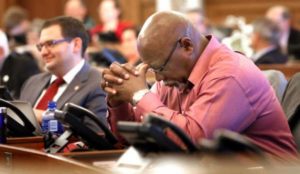Post Highlights
- Packed house for hearing on SB 53 allowing colleges to keep guns off campus.
- Hearing coincided with statehouse buzz over Rep. Willie Dove having left his loaded .380 pistol in 5th-floor conference room for anyone to access (including the dozens of children who visit the statehouse daily).
- More than 50 proponents testified in favor of SB 53 with a handful of opponents testifying against the bill including former Senator Forrest Knox.
- House Ed Committee hears bill allowing districts to strip homestead exemption in order to gain revenue for special needs students.
- Bill characterized by its main proponent Committee Chairman, Clay Aurand as a “bad bill” but allows legislators to avoid having to vote for a tax increase (passing on that responsibility to the local community instead).
- KNEA advocates for a comprehensive and sensible tax policy instead of trickery to solve Brownback’s legacy of failure.
Keeping Guns Off of College Campuses
Rep. Willie Dove provides tangible evidence of need for responsible gun laws
KNEA testified in favor of SB 53, a bill that would allow college campuses to ban firearms. Our testimony focused on the fact that college campuses are occupied by young people under an enormous amount of stress – the stress of being away from home for the first time, the stress of adjusting to roommates, the stress of grades and adjusting to new kinds of teaching and learning schedules, the stress of new romantic relationships. We’ve had plenty of examples of what can happen when a highly stressed, anxious individual can do when carrying a weapon on campus.
Those who favor allowing anyone and everyone to carry a gun on campus somehow believe that these tragic events will be less tragic if more people pull out weapons and try to quickly “take down” an attacker. The sad fact is that adding more guns to the situation including guns in the hands of untrained individuals simply increases the possibility that more people will be shot. Additionally, it puts law enforcement responders who must react quickly and decisively in the position of trying to sort out the “good guys with guns” from the “bad guy.”
This week also had a special “gun show” under the dome! During a House Education Committee meeting in which the Kansas Teacher of the Year team was making a presentation, Representative Willie Dove (R-Bonner Springs) left the committee room appearing to be in anger. And he left behind his own loaded handgun! We can only assume that Rep. Dove needs to carry heat in the capitol to protect him from angry constituents.
The capitol hosts hundreds of school children every day. Teachers take those children through committee rooms. When the committee rooms are empty, children pose at the tables where Senators and Representatives debate bills. Imagine what happens when a curious 9-year-old finds a loaded pistol just sitting there.
Will SB 53 stop an individual intent on doing harm from acting? No. Will it decrease the likelihood that a tragic situation will escalate into something more deadly? Certainly. And will SB 53 stop law-abiding citizens from making a Willie Dove mistake? Absolutely. If the capitol was a firearms free building, we assume a law-abiding citizen like Rep. Dove would have left his weapon in his car. No weapon would have been inadvertently left loaded and ready where anyone could pick it up.
House Education Committee Considers Letting School Boards Waive Homestead Exemption
Kansas homeowners get a break on property taxes with something called the Homestead Exemption. This allows the first $20,000 of assessed valuation to be exempt from property taxes.
House Education Committee Chairman Clay Aurand (R-Belleville) introduced HB 2078 which would allow school boards to waive part or all of the Homestead exemption by passing a resolution. Such a resolution would be subject to a protest petition. The impact would be to allow school districts raise additional money through property taxes.
Aurand held a hearing for HB 2078 yesterday during which he emphatically called this a “bad bill” before reversing course saying, “maybe that’s a stretch.”
Most of the questions on the bill dealt with how it would impact equity issues in school finance. The state has already lost the issue of equity at the Supreme Court level. The legislature responded with legislation to restore equity. The Supreme Court ruled then that the equity issue was appropriately addressed.
Aurand believes that the exemption is constitutionally questionable and further noted that passage of this bill would allow districts to get more money while legislators would not have to vote for any tax increase. This has become a common trend in the Kansas legislature – they love to pass the hard decisions on taxation and revenue collection on to local units of government. Legislators can then boast that they did not raise taxes even as their constituents complain about their taxes going up.
Legislative policy under the leadership of Governor Sam Brownback has been to cut revenue to the point where services suffer and then count on cities, counties, and school districts to use whatever authority they have to make up the difference.
It’s time for legislators to abandon trickery and face up to the task at hand. The legislature needs to reverse course on the disastrous and irresponsible tax policies they have put in place since 2012 and pass a new tax plan that provides for the needs of our citizens.




